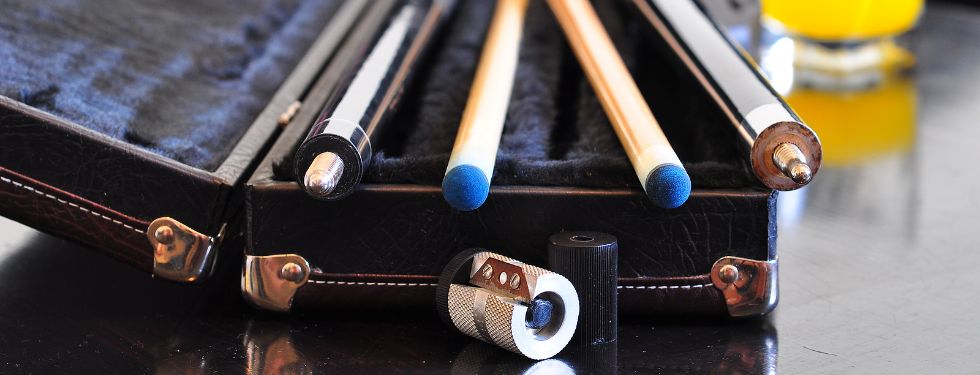For both seasoned players and newcomers to the world of billiards, selecting the right pool cue is an important decision. However, just as important is choosing the right pool cue case to protect that investment.
Whether you’re a casual player or a pro, the right cue case ensures your cue remains in optimal condition, ready for every game. This guide will walk you through everything you need to know about selecting the best pool cue case for your needs, including types, materials, features, and maintenance tips.
Why You Need A Pool Cue Case
Your pool cue is more than just a tool; it’s an extension of your playing style. Whether you’re using a two-piece cue or a one-piece stick, your cue is essential for precision and ball control.
A good cue case provides the protection your cue needs, shielding it from damage, moisture, and environmental wear and tear. Without a reliable case, your cue could suffer from warping, scratches, or even breakage, all of which can drastically affect your game.
Finding The Best Pool Cue Case For Your Needs
Your search for the perfect pool cue case should include consideration of your specific needs, playing style, and personal preferences.
- Casual Players: For those who play occasionally, a simple, lightweight nylon pool cue case might suffice.
- Serious Competitors: Seasoned players who travel frequently and own multiple cues should invest in a hard pool cue case or a vintage pool cue case for the best protection and style.
- Collectors: Custom pool cue cases can offer a unique touch, preserving the value of collectible cues while providing a personalized flair.
Types Of Pool Cue Cases
Choosing the right type of cue case depends on your playing frequency, the type of cues you own, and how often you travel with them. Here are the main types of cue cases:
Hard Pool Cue Cases
These cases are constructed from robust materials such as stainless steel or leather. They offer superior protection, making them perfect for those who travel frequently and need to safeguard their cues against potential damage. Options like a hard pool cue case or a pool cue case with a stand can be quite beneficial. Hard pool cue cases can provide more protection while still staying sleek and stylish, like our Katana KATCO2 2×2 Hard Cue Case.
Soft Pool Cue Cases
Softer cases are lighter, easier to carry, and typically more affordable, making them suitable for players who play pool casually or don’t travel extensively. A choice like the Action ACSC09 2×2 Leatherette Soft Cue Case is perfect for taking your cues to the local watering hole. They are ideal for casual players who prioritize portability over extreme protection.
Box Cases
These resemble small briefcases and are usually made from wood or synthetic hard materials. Box cases provide excellent protection and a touch of vintage elegance. Some, like the Aramith ARABX 2×2 Box Case even have storage for a complete set of billiard balls. They’re an excellent choice for those who want to combine style with functionality.
Cue Travel Cases
Specifically designed for players on the go, cue travel cases combine durability with portability. They often include extra compartments for accessories like billiards chalk, jump cues, and other essential items.
Custom Cue Cases
For players seeking a personalized touch, custom cue cases offer the ability to tailor the case’s design, material, and features to your specific needs. Many manufacturers offer customization services, allowing you to choose the material, color, design, and even add your initials or logo. This option is perfect for those who want something unique and tailored to their style.
Pool Cue Case Materials
When it comes to cue cases, the material is a key factor. Cue cases are typically made from leather, vinyl, or nylon, each offering distinct benefits.
- Leather Cue Cases: Leather cases are durable, stylish, and provide excellent protection. They are favored by pro players for their luxurious feel and longevity. Leather cases are ideal for those who want to combine style with functionality.
- Vinyl Cue Cases: Vinyl cases are a more budget-friendly option, offering a good balance between protection and cost. They’re easy to clean and come in a wide range of designs.
- Nylon Cue Cases: Lightweight and portable, nylon cases are great for casual players who prioritize convenience. While they may not offer the same level of protection as leather or vinyl, they are perfect for players who prefer to travel light.
- Metal Pool Cue Cases: For maximum protection, metal cases are unbeatable. They resist dents and damage while looking sleek and professional.
Cue Case Features To Consider
- Number of Cues: Determine how many cues you need to carry. Most cases can hold anywhere from one cue to a playset of four, with some larger cases offering extra space for jump cues or spare shafts as well as additional cues.
- Cue Length: Ensure the case fits your cue length, especially if you use a two-piece pool cue or a longer, specialized cue.
- Storage Compartments: Additional compartments for cue maintenance items, and other accessories can be a big plus. Look for cases with sufficient storage to keep everything organized.
- Case Upright Design: Some cases are designed to stand upright, which can be handy during play and storage.
- Portability: If you travel frequently, consider the weight and ease of carrying the case. Lighter cue cases, those with shoulder straps, or a wheeled one like the Action AC1224 12×24 Traveling Case can make transportation easier.
Cue Protection & Maintenance
Proper maintenance of your cue case is essential for ensuring long-lasting protection for your playing cue.
- Keep It Clean: Regularly clean your case, especially if it’s made of leather or vinyl. Use appropriate cleaners to maintain the material’s integrity.
- Store Properly: When not in use, store your cue case in a cool, dry place. Avoid leaving it in hot cars or damp environments, as this can damage both the case and the cue inside.
- Check for Wear: Periodically inspect your case for signs of wear and tear, such as fraying or broken zippers. Address these issues promptly to avoid compromising your cue’s protection.
Budget Considerations
While it’s tempting to opt for the cheapest option, remember that a good cue case is an investment in the longevity of your pool cue. Budget cue cases can still offer decent protection, especially if you play pool casually.
However, if you’re serious about your game, investing in a high-quality case is worth it. Balance your budget with the level of protection and features you need.
What Are The Best Pool Cue Cases For Travelling?
For frequent travelers, hard pool cue cases are the best option due to their durability and high level of protection. Choose a model with padded interiors and secure closure mechanisms.
Can I Carry Multiple Cues In One Case?
Yes, multiple cue cases are designed explicitly for this purpose, enabling players to carry several cue sticks and accessories in a single bag.
How Important Is The Material Of The Cue Case?
The material is critically important as it affects the level of protection and the case’s longevity. For example, leather cases offer both durability and an attractive aesthetic, while nylon cases are more affordable and lightweight.
Are Custom Pool Cue Cases Worth The Investment?
Absolutely! Customized cases allow you to personalize your cue case according to your aesthetic preferences and specific needs, offering unique features not found in standard cases.
Finding The Best Pool Cue Case For You
Choosing the right pool cue case is about more than just protection; it’s about ensuring your cue is always ready for play, whether you’re heading to a pro tournament or a casual game with friends. By considering factors like material, type, features, and maintenance, you can select a cue case that not only safeguards your pool sticks but also complements your playing style.
Remember, the right case is an investment in your game, ensuring your cue remains in top condition for years to come. Contact Billiards N More to find a cue case that is perfect for you.



